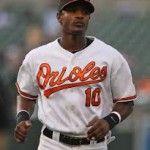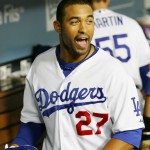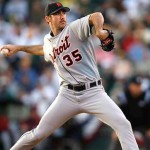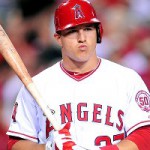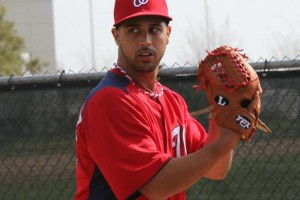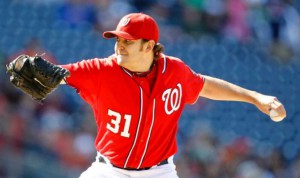Predicted Division Winners and why:
- NL East: Washington. I thought it was going to be a close race in 2014 until Atlanta lost 3/5ths of their rotation. The rest of the division is awful; there could be a 20 game gap between 2nd and third place.
- NL Central: St. Louis. What they lost in offense via FA they’ve more than made up for in their off-season acquisitions, plus they replace Jake Westbrook‘s awful starts with Michael Wacha‘s potentially ace-level starts. No reason they’re letting off the gas now. The best organization in the game.
- NL West: Los Angeles Dodgers. Essentially the same team that ripped off a 42-8 streak last year, and they can only get better when injured super stars like Matt Kemp and Chad Billingsly come back from injury. Can and will buy whatever they need to stay on top.
- AL East: Tampa. Lots of people are trendy-picking Tampa … and I think Tampa’s improved for sure. But Boston hasn’t exactly regressed, and they won the most games in the sport last year to go along with the WS crown. Boston has replaced key veterans with uber-prospects, who could go either way. Meanwhile Tampa is rolling out basically the same team that would have won any other division easily, they kept David Price, and they’re getting a full season out of ROY Wil Myers. I see this race going down to the wire with Tampa winning it.
- AL Central: Detroit hangs on for another year, despite some curious personnel moves this off-season. It helps to have two of the best arms and the best hitter in the game. But it’ll be much closer over Kansas City and Cleveland than they want, thanks to
- AL West: Oakland: Texas can’t go 48 hours without losing another player to injury. The Angels have half a rotation and a bunch of overpaid underperforming sluggers on their team. Seattle spent hundreds of millions of dollars in the off-season so they can lose 85 games again. And Houston remains a laughing stock; they’ll be pressed to win 60 games again. Oakland’s got as many SP injuries as Texas … but also has Billy Beane at the helm and he’s always ready to make a move.
Wild Cards
- NL: Atlanta and Cincinnati: Atlanta may have lost a lot of their rotation … but Minor’s only out a month and the kids they’re throwing out there may be able to tread water. Atlanta’ still has the same offense basically that bashed their way to 96 wins. But it’ll be close. Meanwhile I see both Cincinnati and Pittsburgh taking steps back. The question will be who steps back furthest. Cincinnati lost some offense but replace it with a potential 100-steals guy who’s a defensive whiz in center; it could be a net gain on both sides of the ball. Meanwhile Pittsburgh mostly stood pat, letting their #2 pitcher walk away and replaced him with a guy who was flat out released last year by one of the worst teams in the game (Edinson Volquez). Maybe he’s just a place holder for Jamison Taillon … but that’s still 2 months of potential 6.00 ERA/bullpen sapping performances coming their way. The Pittsburgh fans have to be somewhat dismayed that their 90+ win team did basically nothing to maintain their competitiveness the following year. There’s not another team close in the NL: Arizona was a .500 team but they seem like they’ll be at best a couple games better, but not enough to be in the discussion. Does anyone think the Giants are winning 15 more games this year than last? Perhaps Milwaukee could make some noise and get into the race; that’d be my dark horse.
- AL: Boston and Kansas City: Tampa’s a great team and may very well switch places with the Red Sox as division champs, but for now we’re predicting that Boston has lost *just* enough to lose the division. Meanwhile I think KC finally makes the leap. They had last year to improve; this year they gel and overtake Cleveland in the division. They’re going to press Detroit (who always seems better than their record; how do they *only* win 93 games last year with the pitching and hitting they had?).
Its folly enough to do divisional predictions on day one of the season … even more so to predict who will finish with the best records and thus predict who gets the wild cards. But i’ll give it a shot. In the AL: Tampa, Detroit, Oakland in that order of victories, meaning Tampa gets the WC winner. In the NL: Los Angeles, St. Louis and then Washington, meaning LA gets the wild card and StL would have home-field over the Nats.
Playoff Predictions:
- NL play-in: Cincinnati has the better big-game pitcher and squeaks out one against Atlanta
- AL play-in: Kansas City may have gotten there … but they’re not in the post-season for long as Boston bashes them to make the
- NL Divisional Series: St. Louis outlasts Washington in a heart-breaking revisit to the 2012 NLCS. Los Angeles pummels the ace-less Reds behind their own 1-2 punch of Kershaw and Greinke.
- AL Divisional Series: Tampa outlasts Boston in a 5-game tear-jerker, while Detroit beats out Oakland in a complete re-peat of 2013’s playoff series.
- NLCS: Los Angeles solves St. Louis’s pitching staff enough to win the Pennant.
- ALCS: Tampa gets the better of Detroit’s aces.
- World Series: NL over AL: Los Angeles’ spending pays off with a 6-game victory over Tampa.
